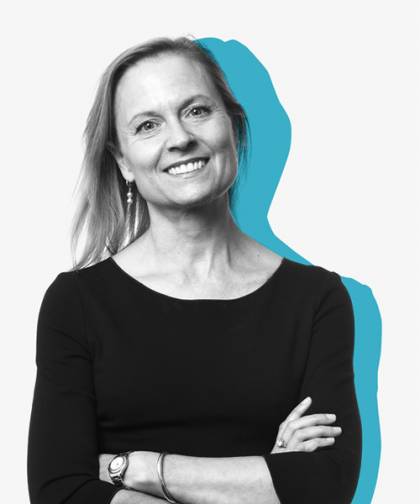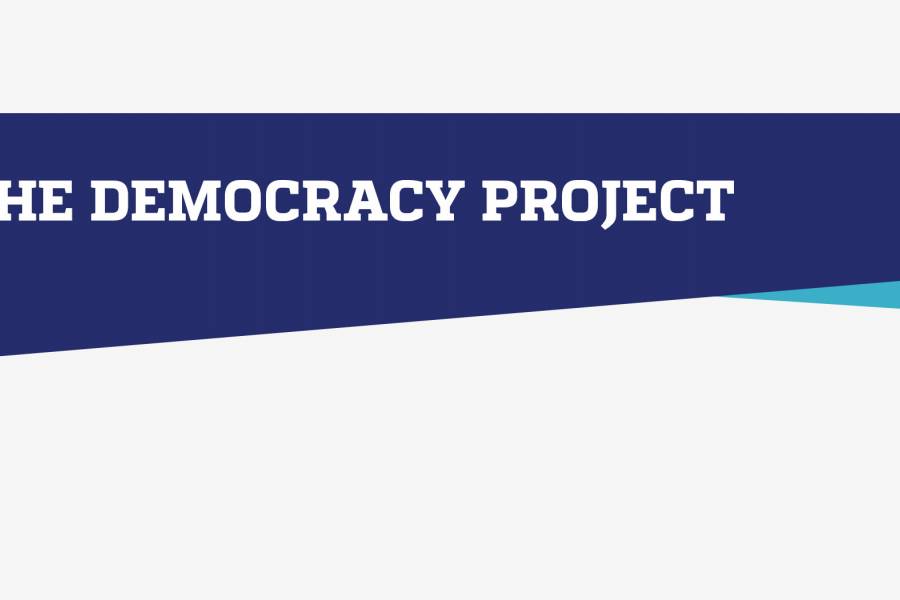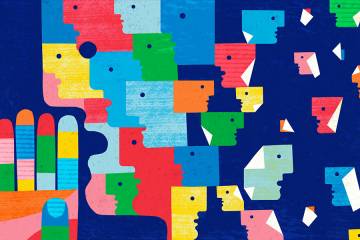
Image caption:Ashley Rogers Berner is an associate professor of education and deputy director of the Johns Hopkins Institute for Education Policy, a center dedicated to integrating the domains of research, policy, and practice to promote educational excellence for America’s students. She researches the structure, content, and civic outcomes of democratic school systems around the world.
Image credit: Will Kirk / Johns Hopkins University
What worries me about the future of American democracy? We aren't systematically equipping young people with the knowledge, skills, and habits they need for effective citizenship. Political scientists often refer to four common measures of citizenship behavior: community service, civic skills, political knowledge, and political tolerance. These measures reflect a combination of specific knowledge (history, geography, civics), democratic capacities such as analyzing legislation and writing letters, and civic attachment, i.e., what are my obligations to this community and this nation? Getting there requires practice and mastery, which schools, families, and the broader society are tasked with providing.
We're failing on all four measures. The latest round of nationally representative tests in 2018 shows that not even one-third of our country's K-12 students are deemed proficient in civics, geography, or U.S. history—not in fourth grade, not in eighth grade, and not even upon high school graduation. As for practicing the art of civil disagreement, who knows? Our country no longer participates in the International Civic and Citizenship Education Study, which tracks whether students habitually engage in classroom debate and deliberation. American adults may be of limited help; surveys show suboptimal civic knowledge, while partisanship influences even our response to COVID-19.
This fractured state of affairs has many causes, but I want to focus on one: America's pedagogical retreat from academic content. Precise knowledge about the world and routine application of this knowledge are critical components of informed civic participation. Since the early 1900s, however, American educational practice has placed skills over knowledge, process over content—"learning how to learn" rather than learning something specific (see here and here).
Our country's avoidance of content may work tolerably well in wealthy communities that give kids access to background knowledge about the world. But this avoidance is devastating for low-income students—and the resulting achievement gaps between well-off and less-well-off students persist, to our national shame. Education policy has focused mainly on English and math scores, which are also suboptimal, but civics deserts exist across the country.
What gives me hope for our democracy? This long-standing trend of pedagogical flight from content is beginning to reverse.
Intellectually, a new generation of researchers and writers is making the case for more challenging curricula, building off of E.D. Hirsch's Cultural Literacy (1987), The Making of Americans (2009), and Why Knowledge Matters (2016). Daniel Willingham's clinical research and journalistic case studies, such as Natalie Wexler's best-selling book, The Knowledge Gap (2019), are informing the field.
Empirically, scholars are beginning to demonstrate the powerful effects of high-quality curricula to narrow achievement gaps and accelerate student learning. International research has long supported this; many of our democratic peers (e.g., the Netherlands, Belgium, Canada, Hong Kong) require all students to master entire bodies of knowledge in the major subjects.
Practically, across the country, school systems are leaning into this work. The two most important member organizations for state educational leaders, the Council of Chief State School Officers and Chiefs for Change, have launched major initiatives that promote high-quality instructional materials. Urban districts such as Chicago and Washington, D.C.; high-caliber charter networks such as Success Academies, Achievement First, and Uncommon Schools; and strong private schools (e.g., the Catholic New York City Partnership Schools) are replacing low-quality, nonsequenced, and ho-hum materials with challenging texts and resources that build knowledge systematically. They are also supporting teachers in delivering more challenging instruction.
The above efforts have prioritized math and English language arts, but science and social studies are not far behind. Many legislatures and departments of education are rethinking their approach to K-12 civics coursework and assessments for the better. As but one example, in 2013–14 the Florida Department of Education began to require middle school students to pass an end-of-course civics assessment, and 10th-graders to pass a U.S. history exam, as conditions of graduating.
The intellectual, empirical, and practical foundations are being laid for a reimagining of the American curriculum, which, coupled with the urgency born of our political fissures, gives me hope for the next generation of young citizens.
About The Democracy Project
The future of democracy as a system of government is increasingly uncertain. With a rise of populist forces globally and many existing democracies in regression, liberty itself seems under assault. In the United States, a diminished or warped democracy could have far-reaching repercussions for voting rights, the rule of law, education, the application of science, immigration, citizenship, and long-held societal norms we take for granted.
As we near an election in which many of the defining principles of democracy seem to hang in the balance, an array of Johns Hopkins experts will share their greatest hopes, their deepest fears, and their informed insights on the state of America's democratic experiment. Read more from The Democracy Project
Posted in Voices+Opinion, Politics+Society
Tagged education, democracy, institute for education policy, hopkins-votes









